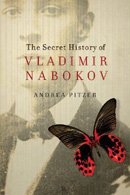Nabokov, Feynman, and the names of trees
What do Richard Feynman, theoretical physicist, and Vladimir Nabokov, author of Lolita, have in common? For one, synesthesia—a blending of sensory input experienced by four percent of the population. Letters for Nabokov came paired with specific colors, and Feynman similarly reported seeing “light tan j’s, slightly violet-bluish n’s, and dark brown x’s flying around” in equations.
Looking into Feynman’s synesthesia recently, I came across a video that addresses, in an oblique way, a question people have raised about The Secret History. The suggestion that Nabokov’s protagonists (Lolita, Pale Fire, Despair) have backstories tied to the horrors of their century—ones that can be hazily glimpsed through the lines of the text—led one reviewer to suggest that this “interpretation makes Humbert and Kinbote rather less interesting as characters, easier to place, more comprehensible.” He wrote that a “‘secret history’ implies a history that can be uncovered and then understood.” But Nabokov, he argued, was after far more than that.
So then, does binding Nabokov’s madmen to their times and places—places they themselves introduce into their stories—also box them in and damage the artistry of the novels? I would agree, if doing so flattened them out, or simplified them, or excused their actions. But that’s not what I intended The Secret History to do.
As surely as Humbert’s sins are his own, and unforgivable, it is also true that he has been broken by history. His suffering has not ennobled him; instead, it has driven him mad, just as historic events had destroyed Despair’s Hermann decades before, and character after character in Nabokov’s novels and short stories in between.
I’m arguing for more complex main characters, ones who are both monsters and something else. Like the monstrousness, that something else requires a response from readers, in the form of attention to Nabokov’s narratives and the readers’ own ways of being in the world. Holding a more complex view of Nabokov’s creatures that excuses nothing but sees them whole—or as close as we can get to seeing them whole—is a challenging and valuable thing.
Nabokov liked to use traceable details to frame his books and then to cloak his scaffolding in rich language and imagery. But the importance of observing and understanding the real world was never lost. His once-student and later annotator Alfred Appel told a story about a friend who went to see Nabokov when he was a professor at Cornell. Nabokov directed the student to look out the window. “Do you know the name of that tree?” Nabokov is said to have asked. The friend replied that he did not. Nabokov’s response was, “Then you’ll never be a writer.” I believe that attending to the settings of Nabokov’s novels is as important as knowing the names of trees.
A Feynman video from YouTube addresses a similar idea. In it, the physicist (who first worked on the Manhattan Project and later revolutionized the field of quantum physics) talks about an artist friend of his. The friend, he explains, once held up a flower and said, “I as an artist can see how beautiful it is, but you as a scientist… take this all apart, and it becomes this dull thing.”
Feynman protests:
First of all, the beauty he sees is available to other people and to me, too. I believe—although I may not be quite as refined aesthetically as he is—that I can appreciate the beauty of the flower.
And Feynman suggests there is even more to see that is easily missed, and that is worth looking at, too:
I could imagine the cells in there, the complicated actions inside, which also have a beauty. I mean it’s not just beauty at this dimension of one centimeter, there’s also beauty at a smaller dimensions: the inner structure, also the processes…
The science knowledge only adds to the excitement, the mystery, and the awe of a flower. It only adds. I don’t understand how it subtracts.
I don’t think historical knowledge explains everything about Nabokov’s books, or even everything about his main characters. So much remains hidden and unknown, and the books derive much of their power from these missing pieces. But I do believe a closer look at history opens up whole new perspectives on what Nabokov was up to. Seen this way, historical spelunking only adds to his accomplishments; it does not subtract. It’s another way of knowing the names of trees.
